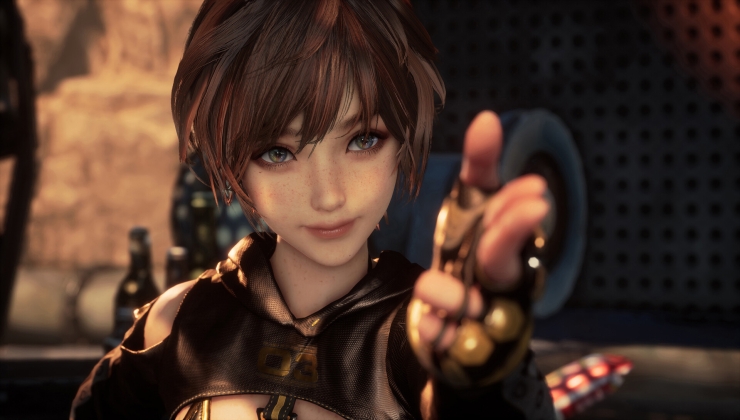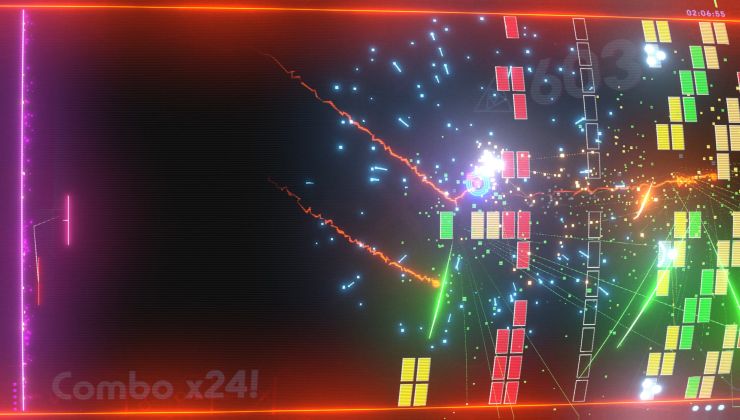NVIDIA continue to fix up and improve their Linux drivers, with a brand new Vulkan Beta Driver available today.
This is the testing area where NVIDIA put in new features, add in new Vulkan API support like the provisional vendor-neutral Ray Tracing that went in recently and more that eventually make their way into their normal drivers. Here's the highlights of the Linux 440.66.07 driver:
- New:
- Multi thread-capable deferred ray tracing pipeline creation
- Allow presenting from queue families which only expose VK_QUEUE_COMPUTE_BIT when using XCB in addition to Xlib surfaces [Linux]
- Fixes:
- Added a workaround for Linux Steam Play title DOOM Eternal, which overrides application requested memory locations, to ensure performance-critical resources be placed in video memory [Linux]
- Correctly cap the drawCount for vkCmdDrawIndirectCount and vkCmdDrawIndexedIndirectCount on Turing GPUs
- Fixed descriptor indexing with large arrays and large blocks
You can see the Vulkan Beta Driver on the NVIDIA website. Only use them if you want to test the very latest stuff. You can tell they're the Beta drivers by the extra two digits in the version number.
Note: The newest stable version of the NVIDIA drivers for Linux is 440.64 that released on February 28.
Some you may have missed, popular articles from the last month:
All posts need to follow our rules. For users logged in: please hit the Report Flag icon on any post that breaks the rules or contains illegal / harmful content. Guest readers can email us for any issues.
Not sure if this will include fixes to get their DKMS garbage to compile right against kernel 5.6, but if not, I've had some luck with this patch someone else figured out:
[NVIDIA 440.64 - Kernel 5.6](https://gitlab.com/snippets/1945940)
(e.g. for Gentoo users, just grab that raw and drop it in as /etc/portage/patches/x11-drivers/nvidia-drivers-440.64/linux-5.6-compatibility.patch , then re-emerge x11-drivers/nvidia-drivers )
I still regret buying a GTX 980 years ago, now that AMDGPU exists, but still.
[NVIDIA 440.64 - Kernel 5.6](https://gitlab.com/snippets/1945940)
(e.g. for Gentoo users, just grab that raw and drop it in as /etc/portage/patches/x11-drivers/nvidia-drivers-440.64/linux-5.6-compatibility.patch , then re-emerge x11-drivers/nvidia-drivers )
I still regret buying a GTX 980 years ago, now that AMDGPU exists, but still.
1 Likes, Who?
Is there a PPA for beta drivers in Ubuntu? I've relied on packaged driver for so long I've forgotten the basics
0 Likes
The way I do it (xubuntu):
- Download the driver
- chmod +x on the package
- log into to tty1, run > sudo service lightdm stop
- launch the package, follow the instructions
- sudo service lightdm start
there you go, there's a chance you might have to do it again next time you update you kernel.
I'm getting 120+ FPS @ 1440p Ultra Nightmare settings now :) (RTX 2080)
- Download the driver
- chmod +x on the package
- log into to tty1, run > sudo service lightdm stop
- launch the package, follow the instructions
- sudo service lightdm start
there you go, there's a chance you might have to do it again next time you update you kernel.
I'm getting 120+ FPS @ 1440p Ultra Nightmare settings now :) (RTX 2080)
2 Likes, Who?
I was able to purge nvidia drivers through apt, and install manually. Also able to keep prime-select to enable gpu offload and power savings, so that's good.
I was kind of hoping this driver might have an impact on Wreckfest performance, and it looks like it definitely did - so the D:E fix might have an impact on other games too.
I was kind of hoping this driver might have an impact on Wreckfest performance, and it looks like it definitely did - so the D:E fix might have an impact on other games too.
0 Likes
Added a workaround for Linux Steam Play title DOOM Eternal, which overrides application requested memory locations…Wait, WHAT?!
In other words, "DOOM Eternal" has instructions to specifically place resources in system RAM instead of VRAM if ran on Linux? I mean, Windows® users do not encounter the "resources are in RAM" issue, that mean developers deliberately wrote the application to misbehave on Linux. That's a sabotage!
0 Likes
Added a workaround for Linux Steam Play title DOOM Eternal, which overrides application requested memory locations…Wait, WHAT?!
In other words, "DOOM Eternal" has instructions to specifically place resources in system RAM instead of VRAM if ran on Linux? I mean, Windows® users do not encounter the "resources are in RAM" issue, that mean developers deliberately wrote the application to misbehave on Linux. That's a sabotage!
How you come to that conclusion when it's fine on AMD in linux.
Think you need to take the tin foil off
1 Likes, Who?
Windows driver works bit different in some aspects, game relies on windows behavior. It's likely unintended id fault.Added a workaround for Linux Steam Play title DOOM Eternal, which overrides application requested memory locations…Wait, WHAT?!
In other words, "DOOM Eternal" has instructions to specifically place resources in system RAM instead of VRAM if ran on Linux? I mean, Windows® users do not encounter the "resources are in RAM" issue, that mean developers deliberately wrote the application to misbehave on Linux. That's a sabotage!
Last edited by Xakep_SDK on 2 Apr 2020 at 9:02 am UTC
0 Likes
I say more like a NV driver issue or AMD/Intel would have had to do same.
0 Likes
For those of you trying to make the beta driver work with kernel 5.6.x, you'll need to apply a patch to Nvidia's module code in order for it to compile.
I found this which was able to help me get it up and running on Fedora 32 (running kernel 5.6). https://gitlab.com/snippets/1945940
Nice performance improvements overall, he's hoping that the updates make their way into a stable driver release soon!
I found this which was able to help me get it up and running on Fedora 32 (running kernel 5.6). https://gitlab.com/snippets/1945940
Nice performance improvements overall, he's hoping that the updates make their way into a stable driver release soon!
0 Likes
That's awesome but there's a question that occurs to me every time I see these kinda news. Should I buy a Nvidia or an AMD card? Because on one hand, Nvidia is really spitting code on a weekly basis and really improving its drivers but on the other hand, AMD's driver is FOSS and is being improved at almost, if not the same pace as Nvidia's. What do you guys think about it?
Last edited by BrazilianGamer on 2 Apr 2020 at 7:25 pm UTC
Last edited by BrazilianGamer on 2 Apr 2020 at 7:25 pm UTC
0 Likes
Should I buy a Nvidia or an AMD card?
Nvidia provide same-day support for their hardware with their proprietary driver. The proprietary driver has some quirks, since that same-day support is because it shares its pedigree with their Windows driver. With AMD you need to wait a while for the support to be enabled, then trickle down to end users, and then be polished up. If you're on a rolling release distro, or don't mind getting your hands dirty, or have an older card, so that you can get AMD's wine as soon as it becomes fine, AMD works OK.
If you want the highest performance, AMD doesn't currently have anything that competes with Nvidia's high end. For the mid-range, where most people are, there are plenty of options from both of them to choose from, so you can pick whichever matches your budget, performance requirements, and preferences.
Edit to add: this is for desktops, since you mentioned getting a card. When it comes to laptops, don't go for Nvidia. Optimus is just a nightmare.
Last edited by CatKiller on 3 Apr 2020 at 12:50 am UTC
2 Likes, Who?
Should I buy a Nvidia or an AMD card?
Nvidia provide same-day support for their hardware with their proprietary driver. The proprietary driver has some quirks, since that same-day support is because it shares its pedigree with their Windows driver. With AMD you need to wait a while for the support to be enabled, then trickle down to end users, and then be polished up. If you're on a rolling release distro, or don't mind getting your hands dirty, or have an older card, so that you can get AMD's wine as soon as it becomes fine, AMD works OK.
If you want the highest performance, AMD doesn't currently have anything that competes with Nvidia's high end. For the mid-range, where most people are, there are plenty of options from both of them to choose from, so you can pick whichever matches your budget, performance requirements, and preferences.
Edit to add: this is for desktops, since you mentioned getting a card. When it comes to laptops, don't go for Nvidia. Optimus is just a nightmare.
Thanks man
1 Likes, Who?
That's awesome but there's a question that occurs to me every time I see these kinda news. Should I buy a Nvidia or an AMD card? Because on one hand, Nvidia is really spitting code on a weekly basis and really improving its drivers but on the other hand, AMD's driver is FOSS and is being improved at almost, if not the same pace as Nvidia's. What do you guys think about it?
You read my rant?
https://www.gamingonlinux.com/forum/topic/4128/
Situation now is ok-ish. But it took quite some time to get there.
1 Likes, Who?
That's awesome but there's a question that occurs to me every time I see these kinda news. Should I buy a Nvidia or an AMD card? Because on one hand, Nvidia is really spitting code on a weekly basis and really improving its drivers but on the other hand, AMD's driver is FOSS and is being improved at almost, if not the same pace as Nvidia's. What do you guys think about it?
You read my rant?
https://www.gamingonlinux.com/forum/topic/4128/
Situation now is ok-ish. But it took quite some time to get there.
I read it. Yeah, can't say i don't agree with you. AMD customers should have prime support from day 1. It's a terrible experience, competitively speaking, if your customers, regardless of their platform, don't see a company offering a good support for their products. I think I'll go with Nvidia. Their support is improving fast so it's their drivers. Don't get me wrong, they're just doing that because of Stadia that uses their cards and is built upon Debian and there's lots of servers running their product but hey, at least we are getting benefited from it anyways
Last edited by BrazilianGamer on 3 Apr 2020 at 11:49 am UTC
0 Likes
I believe AMDs prop driver has had day 1 support for their cards, Most of you are referring to the oss driver which AMD does support too but like others have said, it takes time to trickle down the various distros.
NV on the other hand wants no part in the OSS driver for their cards. so in reality amd has better support.
NV on the other hand wants no part in the OSS driver for their cards. so in reality amd has better support.
0 Likes
AMD >>> Nvidia by the simple fact that it supports the oss driver. That's it.
I won't repeat Linus' word here, but case in point.
With mesa and my vega 64, I can play ALL my AAA games in ultra, without problem.
The only problem I encounter with my card, is that opencl is not (yet) supported out of the box in the current blender version.
Still, I see no incentive to give money to nvidia for their ongoing non-support for more than a decade.
I won't repeat Linus' word here, but case in point.
With mesa and my vega 64, I can play ALL my AAA games in ultra, without problem.
The only problem I encounter with my card, is that opencl is not (yet) supported out of the box in the current blender version.
Still, I see no incentive to give money to nvidia for their ongoing non-support for more than a decade.
2 Likes, Who?
Yeah - Linux gamers need to be holding nVidia's feet to the fire, here, or voting with their wallets and going AMD.
I bought an RX 580 for my partner, and she's had basically *no* issues with it under Linux. Heck, even her old card, a Radeon HD 6950 on the old 'radeon' (pre-AMDGPU) driver, worked way way better under Linux than AMD's ancient Windows drivers - she couldn't even play Minecraft under Windows, but it worked flawlessly on Linux with the same card.
nVidia most definitely does not have anything resembling 'day one' support with their binary driver, as noted by multiple people here having to source community patches for their DKMS portion to work with kernel 5.6 - a kernel that's had multiple release candidates for weeks now, because nVidia continues to use generic-sounding global variables in their driver that conflict when the kernel itself picks up the same names for itself (i.e., 'timeval' in this case, having to be patched on the nVidia side to 'nv_timeval' to no longer conflict in 5.6).
The main reason you'd ever have a flawless kernel upgrade is because distros either hold it back for you until the relevant patches are in, they patch it themselves, or nVidia happened to not mess things up this time.
All that said, I don't have any experience yet with AMD cards newer than that RX 580, but if you're talking about brand new, just-released cards, you're probably going to have to be running the latest kernel + Mesa in a rolling-release distro to get any sort of timely support; while she's on Ubuntu, I'm on Gentoo for partly that sort of reason (at least, when I get rid of my GTX 980). Potentially even early release candidates of not-yet-fully-released kernels, 'unstable' builds of Mesa (i.e. the ~amd64 keyword in Gentoo), at least until the card's been out long enough for those versions to stabilize.
Of course, the real solution here would be fully open source hardware - I'd love me a RISC-V machine with a properly open GPU, but... one day. ;)
I bought an RX 580 for my partner, and she's had basically *no* issues with it under Linux. Heck, even her old card, a Radeon HD 6950 on the old 'radeon' (pre-AMDGPU) driver, worked way way better under Linux than AMD's ancient Windows drivers - she couldn't even play Minecraft under Windows, but it worked flawlessly on Linux with the same card.
nVidia most definitely does not have anything resembling 'day one' support with their binary driver, as noted by multiple people here having to source community patches for their DKMS portion to work with kernel 5.6 - a kernel that's had multiple release candidates for weeks now, because nVidia continues to use generic-sounding global variables in their driver that conflict when the kernel itself picks up the same names for itself (i.e., 'timeval' in this case, having to be patched on the nVidia side to 'nv_timeval' to no longer conflict in 5.6).
The main reason you'd ever have a flawless kernel upgrade is because distros either hold it back for you until the relevant patches are in, they patch it themselves, or nVidia happened to not mess things up this time.
All that said, I don't have any experience yet with AMD cards newer than that RX 580, but if you're talking about brand new, just-released cards, you're probably going to have to be running the latest kernel + Mesa in a rolling-release distro to get any sort of timely support; while she's on Ubuntu, I'm on Gentoo for partly that sort of reason (at least, when I get rid of my GTX 980). Potentially even early release candidates of not-yet-fully-released kernels, 'unstable' builds of Mesa (i.e. the ~amd64 keyword in Gentoo), at least until the card's been out long enough for those versions to stabilize.
Of course, the real solution here would be fully open source hardware - I'd love me a RISC-V machine with a properly open GPU, but... one day. ;)
0 Likes
The way I do it (xubuntu):
- Download the driver
- chmod +x on the package
- log into to tty1, run > sudo service lightdm stop
- launch the package, follow the instructions
- sudo service lightdm start
there you go, there's a chance you might have to do it again next time you update you kernel.
I'm getting 120+ FPS @ 1440p Ultra Nightmare settings now :) (RTX 2080)
And just to clarify, if you update your kernel and forget that you manually installed the Nvidia driver, you'll get dropped to the command line on your next boot to remind you. :D
0 Likes













 How to set, change and reset your SteamOS / Steam Deck desktop sudo password
How to set, change and reset your SteamOS / Steam Deck desktop sudo password How to set up Decky Loader on Steam Deck / SteamOS for easy plugins
How to set up Decky Loader on Steam Deck / SteamOS for easy plugins
See more from me